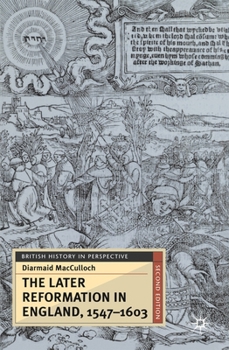The Later Reformation in England, 1547-1603, Second Edition
(Part of the British History in Perspective Series)
Select Format
Select Condition 
Book Overview
The English Reformation was the event which chiefly shaped English identity well into the twentieth century. It made the English kingdom a self-consciously Protestant state dominating the British... This description may be from another edition of this product.
Format:Paperback
Language:English
ISBN:0333921399
ISBN13:9780333921395
Release Date:December 2000
Publisher:Red Globe Press
Length:173 Pages
Weight:0.40 lbs.
Dimensions:0.4" x 5.6" x 8.5"
Customer Reviews
1 rating
The Enigma that became Anglicanism
Published by Thriftbooks.com User , 15 years ago
This little book is filled with the most recent scholarship on the English Reformation. MacCulloch's thesis is that the Reformation that was underway under the reign of Edward VI was cut short by his death. Thus the developments of 1550 (Hooper's refusal to wear vestments) and 1552 (Cranmer's revised Book of Common Prayer)were as far as the English Ref was going to go. The Ref in England experienced "arrested development." Farther than that Elizabeth would not go. Thus all the Evangelical/Puritan/Presbyterian efforts of those who had been schooled under Calvin in Geneva or in Frankfurt during Mary Tudor's brief reign were thwarted as they attempted to take the Reformation further along continental lines desiring to make England look like Zurich or Geneva. The English church remained an odd mixture of early continental Reformed thought encapsulated in the Thirty-Nine Articles and the Book of Common Prayer of 1559 while simultaneously retaining a medieval Catholic structure of bishops, dioceses and parishes. The Elizabethan Settlement of 1559 satisfied almost no one initially, but brutal suppression of Roman sympathizers and radical Puritans alike brought about religious stability by the 1580s. The Elizabethan Church was a large tent where men and women of conflicting religous passions could worship in the same church. According to MacCulloch Anglicanism as we know it did not come into being until Richard Hooker enunciated its ethos in his Laws of Ecclesiastical Polity late in Elizabeth's reign. In the 1590s these men who conformed to the Elizabethan Settlement began to envision a type of Anglicanism that would briefly flower under the reign of Charles I with disastrous consequences. With the Restoration of 1660 the enigma known as Anglicanism never dared to define itself clearly as either Protestant or Catholic and thus made necessity a virtue.





